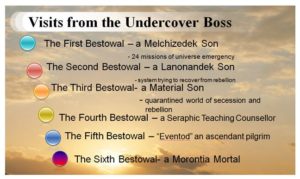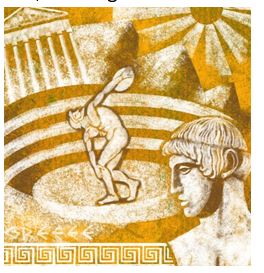
The TV show Undercover Boss shows bosses going undercover in their own companies. Typically, the bosses change their appearance, get a job on the shop floor, or at the shop counter, and experience work in their company as an employee. Eventually they come clean, reveal their true identity and bestow gifts, salary increases and significant sums of money on deserving members of their workforce. Occasionally they will demote or even sack those who are not deserving!
As I thought about my brief to make a presentation based on Part IV of The Urantia Book, the Life and Teachings of Jesus, I began to see some similarities between the undercover boss and Jesus’ experiences on Urantia. He, too, changed his appearance, took a job on the shop floor, that is, human being, and experienced life as a lowly mortal. He, too, eventually revealed himself as the Boss, and bestowed many great gifts upon us, his ‘employees’ – his life as an unparalleled example, his teachings and the Spirit of Truth. (The demotion or dismissal of undeserving mortals did not lie within his brief).
So a catchy title was born – what then of the content? Contemplating the conference theme of more things in Heaven and Earth than are dreamed of in our philosophy, I asked myself what ideas, values, truths, facts, and philosophies were revealed in Part IV that surprised me, and that I had never dreamed of before? One of the advantages of making a presentation is that you can present your own perspective on things, so I have selected those aspects which were and are a welcome and amazing expansion and addition to my own philosophy, on reading this gripping tale of the life of our Boss on Earth, and hope that this personal selection resonates with you and perhaps encourages you to reflect on how your own philosophy has benefited from this amazing book.
I have divided this presentation into two parts, with the significant number of seven sections.
First, a brief survey of some fascinating facts, which we had either no clue about before the book, or had incorrect ideas. These are the previous six bestowals, the birth and early life of Jesus the boy, and some intriguing aspects of his life as a young man.
I will then discuss some of what I consider to be compelling concepts, beginning with one of my personal favourites, Women and Men are equal in the universe! Then I will consider the Boss as an average man – why did he do this and how did he manage it? This leads on nicely to concepts of sacrifice, areas where The Urantia Book is very much at odds with mainstream Christian thought. Finally, and most importantly, his life as an inspiration to us all.
Fascinating Facts
 The Previous Six Bestowals
The Previous Six Bestowals
The Bestowals were an amazing revelation – who had ever thought that we were not the first place to be visited but the last! Michael worked his way down from Heaven to Earth, as it were, from the highest levels of Sonship in his universe to the lowest level of mortal. He tended to choose rebellion-torn systems/worlds where he could. He first served as a Melchizedek, and went on 24 missions in the emergency service. Then he became a Lanonandek Son, and served in a system trying to recover from rebellion. His third mission was as a Material Son on a quarantined world, with no communication with the outside universe, working alone for one generation of planetary time. The value of these bestowals is described in this quote:
Never since this marvellous bestowal …have any of the Material Sons or Daughters in Nebadon been tempted to complain of their assignments or to find fault with the difficulties of their planetary missions. [Paper 119:3.7, page 1313.2]
The fourth bestowal was as a seraphic teaching counsellor, during which he worked on 22 different worlds. Next he was an ascendant mortal pilgrim on Uversa, going by the name of Eventod, for 11 years of local time, before returning to Salvington.
Michael was very much undercover until just before the sixth bestowal. He was always officially absent on an unexplained mission (p.1309) but, of course, a strange Son or Seraphim would suddenly appear and the local universe watchers would speculate as to who they really were. They were the worst kept secrets in the Local Universe, really. He finally officially came clean just before the sixth bestowal, when he announced to all on Salvington the plans for the sixth and seventh bestowals, morontia mortal and then mortal.
What is the purpose of the bestowal missions? They provide the Creator sons the opportunity to
acquire the viewpoint of [their] own creatures by actual experience in the environment of their existence and as these very creatures themselves, and in so doing, gain the patience born of experiential creature existence. [Paper 119:0.6, page 1309.0]
The Birth of Jesus
And so to the seventh bestowal on Urantia, Michael’s life here as the Undercover Boss. While this was not a secret to the rest of the universe, it certainly was to the people on our planet. There were many truths revealed in The Urantia Book about the birth of Jesus which I was surprised to learn.
First, it was not a Virgin Birth, as Mary was already married to Joseph when she conceived him. There was no Star of Bethlehem, and the book gives an astronomical explanation of how the star story came about – that between May 29th and Sept 29th and Dec 5th there was a conjunction of Jupiter and Saturn. There were three wise men, but they didn’t actually visit until Jesus was three weeks old. There is still some mystery surrounding this aspect, though, as described in the following excerpt:
Certain wise men of Earth knew of Michael’s impending arrival. Through the contacts of one world with another, these wise men of spiritual insight learned of the forthcoming bestowal of Michael on Urantia. [Paper 119:7.6, page 1317.2]
What were these contacts? Visions? Dreams? From which world? There is clearly much more to uncover about this intriguing event, which we will probably have to wait until the Mansion Worlds to find out about.
Jesus as a young man
One of the most fascinating aspects of Part IV is the story of Jesus growing up – if the whole world could only know about this! It filled in all the little details of his personality and early life that were unknown before we received The Urantia Book.
 For example, Jesus was a talented artist and art lover.
For example, Jesus was a talented artist and art lover.
He delighted in drawing landscapes as well as in modelling a great variety of objects in potter’s clay. [Paper 124:1.3, page 1366.4]
During his public life, he visited Flavius the Greek Jew, and greatly admired his art collection, much to the surprise of Flavius. Jesus explained that idolatry in Moses’ day was an issue, but with his current mission on Earth people will no longer confuse the Creator Father with idols of stone or images of gold and silver.
Henceforth, intelligent men may enjoy the treasures of art without confusing such material appreciation of beauty with the worship and service of the Father in Paradise. [Paper 142:4.3, page 1600.4]
Along with his love of art, he was also a skilled harpist, and had a great love for everything musical, encouraging his young friends in singing.
More controversially, he was a strong supporter of athletic competitions. Jewish people disapproved strongly of Greek athletics and sports competitions at the time, viewing  them as exhibitions of heathen vaingloriousness (p.1371), and in their placing of the winners on a pedestal, coming close to idolatry. They were also not comfortable with nudity, or with homosexuality, which were traditionally features of Greek life. When Jesus expressed a strong interest in building a sports stadium at Nazareth, Joseph spoke to him angrily for possibly the only time in their life together. Jesus never spoke of it again.
them as exhibitions of heathen vaingloriousness (p.1371), and in their placing of the winners on a pedestal, coming close to idolatry. They were also not comfortable with nudity, or with homosexuality, which were traditionally features of Greek life. When Jesus expressed a strong interest in building a sports stadium at Nazareth, Joseph spoke to him angrily for possibly the only time in their life together. Jesus never spoke of it again.
But throughout his life he endeavoured to introduce the idea of wholesome recreation into his personal plans, and as far as Jewish practice would permit, into the later program of regular activities for his twelve apostles.[Paper 124:3.9, page 1371.2]
Compelling Concepts
Women and Men are Equal
One of the most pleasant surprises I had on reading Part IV was that in the universe, women and men are equal. Jesus was, by the standards of our day, a strong feminist. The first evidence of this was in his thirteenth year, when he first went to the Passover in Jerusalem.
Women seldom went to the Passover feast at Jerusalem; they were not required to be present. Jesus, however, virtually refused to go unless his mother would accompany them. This inspired other women in Nazareth, and more of them went up to Jerusalem on that occasion than ever before.
On the same visit, he was shocked when his mother left them to go to the women’s gallery.
It had never occurred to Jesus that his mother was not to accompany him to the consecration ceremonies, and he was thoroughly indignant that she was made to suffer from such unjust discrimination. [Paper 125:0.4, page 1377.4]
A day later, in discussions with the priests, among other questions he asked:
Why should mothers in Israel be segregated from the male temple worshipers?” He continued to try and improve the treatment of girls in his culture, in small ways and in large. After the death of Joseph, when he was acting as the father of the family, he made sure that his sisters received some education.
Ordinarily, the girls of Jewish families received little education, but Jesus maintained that girls should go to school the same as boys, and since the synagogue school would not receive them, there was nothing to do but conduct a home school especially for them. [Paper 127:1.5, page 1396.2]
During the travels with Gonod and Ganid, there was that famous scene at the dock in Tarentum when he saw a man berating his wife and gently intervened. Among other comments, he said:
“…man has no rightful authority over women unless the woman has willingly and voluntarily given him such authority.” and “…the loving care and consideration which a man is willing to bestow upon his wife and children are the measure of that man’s attainment of the higher levels of creative and spiritual self-consciousness. … The Father in Heaven treats the Spirit Mother of the children of the universe as one equal to himself.” [Paper 133:2.1, page 1471.1]
This is such a different picture of gender relationships than that portrayed in the Bible and by Christian churches. Throughout my youth in the Anglican Church, I never encountered even a hint of a God the Mother concept, so to read such words in The Urantia Book was an amazing revelation.
And the crowning act in acknowledging the equality of women in the Kingdom – the women’s evangelistic corps. The most astonishing and the most evolutionary feature of Michael’s mission on earth was his attitude towards women. In a day and generation when a man was not supposed to salute even his own wife in a public place, Jesus dared to take women along as teachers of the gospel in connection with his third tour of Galilee. And he had the consummate courage to do this in the face of the rabbinic teaching which declared that it was “better that the words of the law should be burned than delivered to women” (p.1679). The Apostles were astonished and shocked, as was every other Jewish man, although naturally the women were elated, and the women’s corps were able to work with women of “questionable character” and win them to the kingdom – most notably, Mary Magdalene.
The Boss as an average man
A further compelling concept that surprised me a little was Jesus as an average man. Michael’s goal on Earth was to be approachable to the common people, and to live an average life, just like any other person on the planet. He had an ordinary boyhood, and experienced teenager-hood, until at 14 he had to function as a father, on the death of Joseph. From fifteen to twenty he had quite a challenging life, struggling with all the things teenagers struggle with and also having to look after his family. My favourite quote, as the mother of a teenager, is this one:
Having thus tasted the actual experience of living these adolescent years in a world beset by evil and distraught by sin the Son of Man became possessed of full knowledge about the life experience of the youth of all the realms of Nebadon, and thus forever he became the understanding refuge for the distressed and perplexed adolescents of all ages and on all worlds throughout the local universe. [Paper 127:0.3, page 1395.3]
He even had to deal with a proposal of marriage, which he regretfully declined, but with the very kind words “It shall cheer and comfort me all the days of my life.” (p.1403)
As with all the previous bestowals, his experience living the life of one of his creatures made it possible for him to totally empathise with our struggles, and also made it possible for all of us to know that Michael truly understands what we are going through, because he has been through it himself.
Sacrifice
Part IV also sheds much light on the notion of Jesus sacrificing himself for our sins.
Sacrifice has two definitions, according to the Webster dictionary:
- The offering of animal, plant or human life to a deity, as in propitiation or homage;
- The surrender or destruction of something prized or desirable for the sake of something considered as having a higher or more pressing claim.
My understanding of mainstream Christian church thinking is that the death of Jesus was a sacrifice according to meaning 1. They place his death at the centre of their belief system, and believe that this ‘sacrifice’ was to atone for the Fall, to regain God’s love and friendship, which he withdrew when Adam and Eve did not follow his rules.
This implies that God withdrew his love from us in the thousands of years between Adam and Eve and Jesus’ death of the Cross, which I find neither logical nor consistent. As Jesus pointed out at the Temple to his human father Joseph: “The Heavenly Father cannot love his children less than you love me. And I well know, no matter what unwise thing I might do, you would never pour out wrath upon me nor vent anger against me.” If God is a God of love, then such a thing is truly not consistent with his nature.
The sacrifices that Jesus made throughout his life on Urantia are clearly according to meaning 2, and are a reflection of his superb self-control. He controlled all his creative urges – art, and support for athletic competition – to conform to local and family customs.
At the age of 19 he had to sell his harp so that Jude, his younger brother, could go to school.
Thus disappeared the last of his recreational pleasures. He much loved to play the harp when tired in mind and weary in body, but he comforted himself with the thought that at least the harp was safe from seizure by the tax collector.
[Paper 127;4.10, page 1402.3]
Far more than these human sacrifices, throughout his whole bestowal he voluntarily surrendered his sovereignty and his ‘supernatural’ powers. Any miracles happened by accident, and he refused to live anything other than an average normal life right up to the end.
It was an immense revelation to me to discover that the Atonement Doctrine was incorrect, and that if we choose to “follow Jesus”, this means making sacrifices for greater good, as in meaning 2 – a far nobler enterprise, to my way of thinking!
His Life as an Inspiration
The best surprise for me in reading Part IV was to realise that Michael/Jesus didn’t die for us, he lived for us, and not just for us, but for the whole local universe, who were all watching, like there was no other show in the universe – much more popular, I suspect, than the Undercover Boss TV show here on Earth.
He was and is a powerful role model, but an inspiration, not an example. We do not have to try and live Jesus’ life, which is clearly not possible! Our goal is to live our lives in our day and as we are, …by the same means that he lived his. (p.1426) We too can aim to live a true and genuinely human life, and enlarge and enrich our philosophies of life by studying the life lived by our Undercover Boss on our world, and remember every day that he has experienced a truly normal, human life and understands through this experience the challenges that we face

